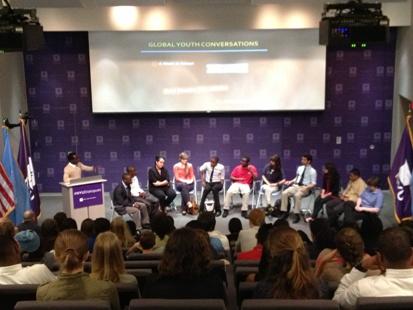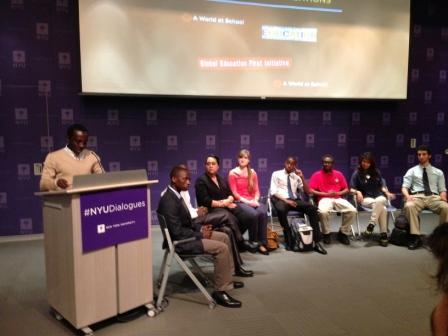
My experience from the youth conversation organized by the Global Campaign for Education:
Nina Tchangoue is a 21 year old from Cameroon, has expertise in climate change and sustainable development. She currently works with the Developing African Youth in Cameroon.
I had a memorable experience with the youth dialogue between the Youth Advocacy Group of the Global Education First and a group of selected students from Washington, DC organized by the Global Campaign for Education on April 17th at the NYU Campus. I had the opportunity to learn what young people from different countries and cultures think about education. It was so interesting to listen to the youth speakers as they shared their personal experience on education.
I learned a lot from the conversation and I am much more motivated to engage the young people of Cameroon in this type of dialogue because it is a real source of inspiration that drives action. I can testify that it inspired me and now it is time for action. My action will consist of mobilizing some students in my community and engaging them into educative talks with the aim to inspire them to take action on an issue like education for all. In other words, I felt the impact youth dialogue can bring in young people’s lives as I experienced it during the conversation organized by the Global Campaign for Education at the Learning for All Ministerial Summit.
I was particularly touched by two questions the participants asked after the video of the 61 millions youths out of school. The questions were as follows:
1. Why so many youths out of school?
Joseph, a member of the Youth Advocacy Group replied: “In the Democratic Republic of Congo, where I am from, children do not go to school because of war and insecurity.” I would add to Joseph’s answer that many youth are out to school for many other reasons such as poverty, the mindset of their parents or guardians who do not believe on the importance of education, ignorance and gender discrimination and the social exclusion of minorities groups and the disabled.
2. What can I do to engage in the fight for education for all?
I was very impressed by this question from a girl student of DC. I would like to let her know that she is highly welcome to raise her voice and join the Youth Advocacy Group of the Global Education First Initiative and its partners in this endeavor.
Lessons from the Global Youth Conversation
Salathiel Ntakirutimana is a 23-year-old representative from Burundi who, at 15, co-founded the Association of Burundian Orphans, is currently studying at Harvard University. His areas of expertise are education for youth, in refugee settings, orphans and vulnerable children, and citizenship.
Two weeks ago I had a distinct opportunity to participate in the Youth Global Conversation on education in Washington DC organized by the Global Campaign for Education. At the beginning of the conversation a video by the UN Special Envoy for Global Education, Mr. Gordon Brown, reminded us how privileged we are to be in school while 61 million other young people have been denied access to education. During the conversation, I was very inspired by the breadth and depth of perspectives that the diverse group of young people shared regarding the problems in the current educational system and some of the solutions that the youth propose to policy makers for the improvement of education for all.
Based on our educational trajectories and experiences and the impact that education has had on our respective lives, we, the panelists and other participants, reiterated that education should not be considered as a privilege for the select few. It is a fundamental right for all children and young people without any discrimination. The panelists highlighted the lack of quality even in the educational systems of the most economically advanced nations. We strongly advised that governments and policy makers take more seriously and invest more in education, the “single best investment” in the future as the UN Secretary General puts it.
Whilst short and rare, the Global Youth Conversation was an excellent platform for the youth to exchange ideas about education and propose some solutions to leaders. Furthermore, it was a great opportunity for us to start thinking about the upcoming celebration of the 16th birthday of Malala Yousafzai, a young person who has distinguished herself and inspired many by sacrificing her life for women’s education in her country. Throughout our conversation, it was very clear that as long as our future is at stake, we will not relinquish our fight for education. Ensuring quality education for all is the right thing to do and as young people, we pledged to always remind our leaders that we will keep them accountable for their actions about education.
Dialogue with DC School Students
Charles Young is a 16 year old from Jamaica with expertise in child protection and engaging youth in politics and government. When not in high school he works with the Child Development Agency.
It only took us a few seconds for us to become comfortable around the Washington DC school students whom we had been introduced to. We had the chance to meet them before entering the stage and exchange names and the countries we are from. The students were vey welcoming and at that specific moment their only concerns seemed to be the fact that they wished they had dressed “more professionally”. After our short but appreciated introductions we proceeded to the stage where we would make our testimonies.
The silence was broken with the fact that 61 million children are out of school and 250 million illiterate. Mr. Gordon Brown, who was to be the facilitator was absent due to unforeseen circumstances, wrote us a heartfelt letter expressing his desire to be present and his gratitude for all the effort being put into the event. After Chernor Bah’s instruction, we (the panelists) introduced ourselves and spoke about our experience as it relates to education. This would be the start of one of the most inspirational experiences of everyone present in the room. While fellow members of the Youth Advocacy Group and I gave overviews of what education means to us, I could not help but notice the awe on the faces of each person in the audience and other members of the panel. Their personal testimonies became living proof of how transformative education is and can be. This in particular highlighted the fact that education was the means by which unfavourable conditions for children could be changed, because you can’t alter where you come from, but education is the means by which you move forward or change where you end up.
In short, all the panelists explored different aspects of an educational experience. Hayley (a member of the Youth Advocacy Group) spoke of her privilege in accessing private education but how other members of her indigenous community in Australia are not so lucky, Anna and David (also members of YAG) spoke about the quality of education, their statements, hopefully, made it clear that we should place keen attention on not only ensuring that every child has access to education but also ensuring that it’s quality education. The rest of the panel, which would include myself, spoke about the lack of awareness and consistency in education. One of the American panelists had been to Haiti for a trip and another has family in the Dominican Republic and they spoke specifically about the children out of school due to social conditions. The issue of drop outs came up; pointing out what should be another point of key interest, keeping children in school after getting them in.
The hour long event proved both thought provoking, inspiring and useful for all the panelists as well as the audience and if there is one thing we learnt through our time together, it would be that to achieve our goal, to truly be the first generation to send all our nation’s children to school, there needs to be a collaborative effort because we all have different experiences and it is these experiences that will make us experts and aid in solving the problem at hand.
To see the entire Global Youth Conversation, click HERE.
To learn more about the Global Education First Initiative Youth Advocacy Group (@GIE_YAG), click HERE.

